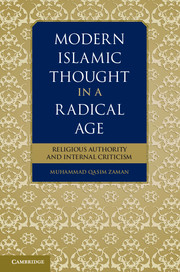4 - Contestations on the Common Good
Published online by Cambridge University Press: 05 November 2012
Summary
This chapter is concerned with some of the ways in which the `ulama, and especially the internal critics among them, have debated ideas of the common good. Maslaha, which I characterize here as public interest or the common good, was a relatively minor part of the medieval legal tradition, but it has come to occupy a substantial space in modern Islamic discourses. This is largely explicable in terms of the opportunities modernizing reformers have sought to jettison or radically reshape inconvenient parts of the legal tradition by appealing to public interest but, crucially, to do so in ways that continue to invoke Islamic juridical terms and categories. I will presently comment on some premodern juristic work on maslaha and its modern defenders. However, irrespective of the precise history of the idea of the common good in the world of Islamic law, the questions it raises are far from trivial. For they concern nothing less than the relationship between God's law and human welfare. What are genuine, rather than illusory, human interests, and who decides what really serves those interests? Is it legitimate to set particular legal norms aside in light of what is taken to be the common good? And what does appeal to changing human interests mean for the timeless authority of the sacred law? Such questions are implicit in the debates we will encounter in the following pages. Yet an analysis of the content of these debates is not the primary goal of this chapter. It is rather to observe the sort of contestation that has often taken place within the ranks of the `ulama, and debates on the common good provide an especially good vantage from which to view some of this contestation. It is also to understand the social significance of this contestation – that is, to explore the implications of the sociological insight that contestation on the common good is constitutive of its conceptions as well as of the public sphere in which the relevant debates take place.
- Type
- Chapter
- Information
- Modern Islamic Thought in a Radical AgeReligious Authority and Internal Criticism, pp. 108 - 140Publisher: Cambridge University PressPrint publication year: 2012



